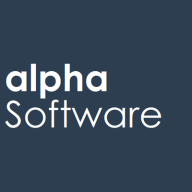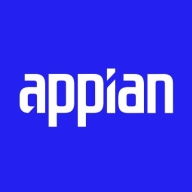

Appian and Alpha Anywhere are competing products in the low-code development platform space. Appian has the upper hand in addressing businesses focused on backend process automation and integration, while Alpha Anywhere shines in developing mobile applications with offline capabilities.
Features: Appian supports process management, automation, and seamless integration with existing enterprise systems, perfect for organizations seeking workflow enhancements. Alpha Anywhere provides offline functionality, flexibility for developing complex mobile applications, and customizable components for varied use cases.
Ease of Deployment and Customer Service: Appian offers a cloud-based deployment that emphasizes quick setup and robust training resources. Alpha Anywhere extends both cloud and on-premise deployment options, appealing to businesses requiring deployment flexibility. Appian focuses on structured support for scalability, while Alpha Anywhere provides hands-on customer engagement during deployment.
Pricing and ROI: Appian typically requires higher initial investments but facilitates efficiency in automation that favorably impacts ROI. Alpha Anywhere's competitive pricing, combined with its versatile features, provides substantial ROI potential, especially for mobile-centric projects.
| Product | Market Share (%) |
|---|---|
| Appian | 5.8% |
| Alpha Anywhere | 0.8% |
| Other | 93.4% |


| Company Size | Count |
|---|---|
| Small Business | 20 |
| Midsize Enterprise | 9 |
| Large Enterprise | 42 |
Alpha Software's Alpha Anywhere platform is a complete business application development and deployment environment that enables users to quickly become proficient in creating mobile business forms and applications that run across all devices. Alpha Anywhere has the unique capability to rapidly create offline capable, mobile-optimized forms and business apps that can easily access and integrate with existing databases and web services, and can exploit built-in role-based security.
Appian is a unified low-code platform and solution used by businesses to build enterprise applications and workflows. This product adapts to the needs of clients and the technologies they are already using to combine their data in a single workflow and maximize resources. The platform has four main components through which it transforms the work process for companies of various sizes. They are:
Appian is utilized across a diverse set of industries, including automotive and manufacturing, energy and utilities, education, financial services, telecom and media, transportation, retail, insurance, healthcare, and life sciences. The most frequent use cases of Appian are customer journey, governance, risk and compliance, operational efficiency, supply chain, distributed order management, and environmental, social, and governance (ESG) management.
Appian Features
Appian has various features that allow users to create solutions for their businesses. These features can be separated into a few groups according to function, including automation, low-code application development, and integrations and data. Some of the most frequently used features of Appian include:
Appian Benefits
The benefits of using Appian include:
Reviews from Real Users
A practice leader - digital process automation at a computer software company values Appian highly because the product is easy to develop, low-code, and has a good user interface.
Alan G., an advisory board member at Codecon VR, Appian offers a clear application life cycle, easy to learn documentation, and comes with a fundamentals course.
We monitor all Rapid Application Development Software reviews to prevent fraudulent reviews and keep review quality high. We do not post reviews by company employees or direct competitors. We validate each review for authenticity via cross-reference with LinkedIn, and personal follow-up with the reviewer when necessary.